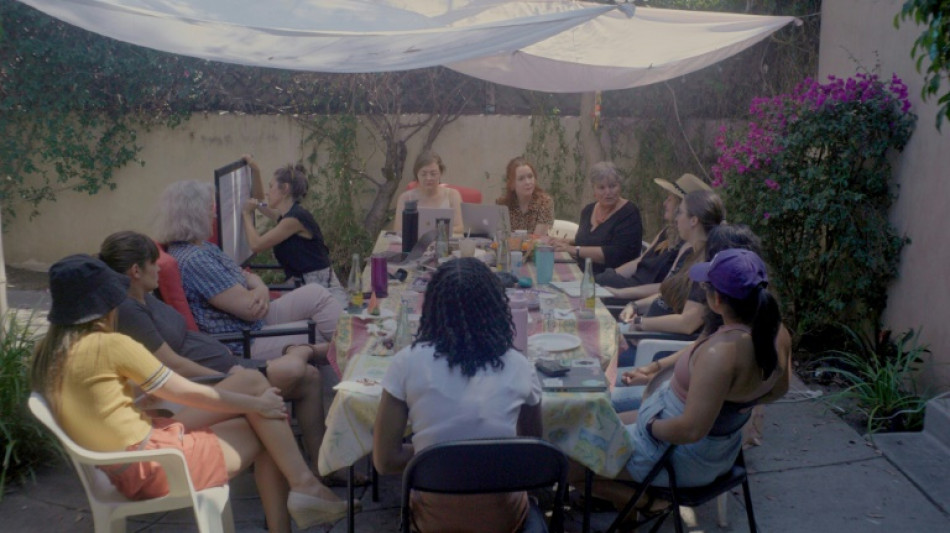
-
 Japan's Fast Retailing raises profit forecast after China growth
Japan's Fast Retailing raises profit forecast after China growth
-
Olympic champion Zheng out of Australian Open

-
 England's Brook 'deeply sorry' for nightclub fracas
England's Brook 'deeply sorry' for nightclub fracas
-
New clashes in Iran as opposition urges more protests

-
 Equity markets mostly down as traders eye US jobs data
Equity markets mostly down as traders eye US jobs data
-
England cricket board launches immediate review into Ashes debacle

-
 Dancing isn't enough: industry pushes for practical robots
Dancing isn't enough: industry pushes for practical robots
-
Asian markets mostly down as traders eye US jobs data

-
 Australia to hold royal commission inquiry into Bondi Beach shooting
Australia to hold royal commission inquiry into Bondi Beach shooting
-
Sabalenka accuses tour chiefs over 'insane' tennis schedule

-
 Cambodia to liquidate bank founded by accused scam boss
Cambodia to liquidate bank founded by accused scam boss
-
Farmers enter Paris on tractors in protest at trade deal

-
 Viral 'Chinese Trump' wins laughs on both sides of Pacific
Viral 'Chinese Trump' wins laughs on both sides of Pacific
-
Stokes vows to stay on but 'wrongs to put right' after crushing Ashes defeat

-
 Lidl to drop broadcast TV ads in France
Lidl to drop broadcast TV ads in France
-
Stokes admits 'wrongs to put right' after crushing Ashes defeat

-
 Sabalenka impresses again in Australian Open warm-up, vows more to come
Sabalenka impresses again in Australian Open warm-up, vows more to come
-
Gilgeous-Alexander to the rescue as Thunder sink Jazz in overtime

-
 From Diaz to 'Mazadona' - five new faces starring at AFCON
From Diaz to 'Mazadona' - five new faces starring at AFCON
-
Startups go public in litmus test for Chinese AI

-
 Death of Bazball: Five things we learned from Ashes series
Death of Bazball: Five things we learned from Ashes series
-
Australia's emotional Khawaja bows out for final time with Ashes win

-
 Asian markets mixed as traders eye US jobs data
Asian markets mixed as traders eye US jobs data
-
Australia win final Test to complete 4-1 Ashes triumph over England

-
 Trump withdraws US from key climate treaty, deepening global pullback
Trump withdraws US from key climate treaty, deepening global pullback
-
Trump pulls US out of key climate treaty, deepening global pullback

-
 Morocco under huge pressure as hosts face Cup of Nations heat
Morocco under huge pressure as hosts face Cup of Nations heat
-
Australia heatwave stokes risk of catastrophic bushfires

-
 Australia 71-2 at lunch, need 89 more to win final Ashes Test
Australia 71-2 at lunch, need 89 more to win final Ashes Test
-
Study shows how fast kilos return after ending weight-loss drugs

-
 Trump pulls US out of key climate treaty, science body: White House
Trump pulls US out of key climate treaty, science body: White House
-
England all out for 342, set Australia 160 to win final Ashes Test

-
 Silver Range Provides an Operational Update
Silver Range Provides an Operational Update
-
Zenwork Joins the National Association of Computerized Tax Processors (NACTP)

-
 Kee Ming Group Berhad Inks Underwriting Agreement With TA Securities Ahead Of ACE Market IPO
Kee Ming Group Berhad Inks Underwriting Agreement With TA Securities Ahead Of ACE Market IPO
-
Market Logic Announces Technology Partnership with Zappi to Accelerate Innovation with AI

-
 Just - Evotec Biologics Receives Grant for AI-Driven Optimization of Monoclonal Antibody Developability for Affordable Access
Just - Evotec Biologics Receives Grant for AI-Driven Optimization of Monoclonal Antibody Developability for Affordable Access
-
Lighthouse Names Georg Beyschlag Chief Financial Officer as Company Scales for Next Phase of Global Growth

-
 Storm in a tea cup for Frank as pressure mounts on Spurs boss
Storm in a tea cup for Frank as pressure mounts on Spurs boss
-
Sesko spark masks Man Utd disappointment for Fletcher

-
 Venezuelan opposition blindsided by Trump, waiting it out
Venezuelan opposition blindsided by Trump, waiting it out
-
Guardiola downbeat about Man City's faltering title bid

-
 City, Villa falter in Premier League title race
City, Villa falter in Premier League title race
-
Trump has options in Greenland, but provocation may be the point

-
 Sesko double not enough as Man Utd stumble at Burnley
Sesko double not enough as Man Utd stumble at Burnley
-
Semenyo stuns Spurs to leave Frank under fire

-
 Inter extend Serie A lead at Parma after Napoli slip
Inter extend Serie A lead at Parma after Napoli slip
-
US stocks retreat from records as oil falls further

-
 City stumble again in title race as Villa held
City stumble again in title race as Villa held
-
Man City title bid damaged by Brighton draw despite Haaland's 150th goal


Abortion pill: the women of the 'resistance'
It is a documentary that evokes the underground abortion networks of the 1960s but the story involves the present day.
"Plan C," airing this week at the South by Southwest festival in Austin, Texas, is about a group of risk-taking women determined to provide access to a safe method of abortion.
Their tool: the abortion pill.
"Plan C" is both the name of the documentary and the organization at the center of the film.
It traces the uphill battle faced by the women between 2019 and 2022 to make the abortion pill more widely available to women in need.
On the one hand, the pandemic expanded the use of telemedicine and allowed for the abortion pill to be dispatched by mail.
On the other hand, abortion -- and the pill -- have now been banned in about a dozen states following a US Supreme Court ruling last year.
"Unfortunately, the anti-abortion folks have largely won," "Plan C" director Tracy Droz Tragos told AFP.
And, she added, "we haven't hit rock bottom here in the United States."
"But more folks know that medication abortion exists, more folks are resisting and making sure that people have access to it," she said. "So there is a workaround to it, there is an answer back."
Plan C, the organization, was founded by two women, Francine Coeytaux and Elisa Wells, in 2015 to disseminate information about the abortion pill, also known as RU 486.
Plan A is contraception. Plan B is the "morning after" pill which is taken by a women after intercourse to avoid becoming pregnant.
Plan C is abortion.
Coeytaux and Wells began their efforts by testing pills that could be purchased on the black market on the internet to verify that they were authentic.
If so, they listed them on their site, plancpills.org.
- 'Like running a drug cartel' -
During the pandemic, with the abortion pills becoming more difficult to find, they put out a call for doctors willing to prescribe them by telemedicine and send them to patients by mail.
"After talking to, you know, like 150 providers, we ended up with maybe five," Wells told AFP.
Plan C provided them with technical help setting up telemedicine businesses or the cost of medical licenses.
The doctors were operating in a judicial grey area until the Food and Drug Administration (FDA) said the abortion pill can indeed by mailed to patients.
That gave rise to a number of telemedicine services.
In June 2022, however, the Supreme Court overturned the constitutional right to abortion giving states the freedom to set their own rules.
Even as access to abortion pills became more restricted, a supplier agreed to continue to send them to Republican-led states where abortion had been banned, notably Texas.
An underground network formed.
"It's like running a drug cartel, in order to help people," said a woman in the film who remained anonymous to protect her identity.
Fear is palpable throughout the movie -- fear for the women using the pills and fear for those who are helping them.
Fear too for what might happen if the flow of pills is cut off entirely and women seeking to end a pregnancy are left with no solution.
Details of how the network operates are deliberately not revealed.
Faces are blurred, voices disguised and locations obscured.
"The fact that it has to feel like this nefarious underground thing is unconscionable," Droz Tragos said. "It's a tragedy."
"I hope we did enough and those folks stay safe," she added.
- 'A form of resistance' -
Finding a platform to distribute a film on such a hot-button issue has been difficult.
Some said it was "too political" and they needed to be "nonpartisan," said Droz Tragos, whose previous documentary about abortion was met with critical acclaim.
The director said she hopes "Plan C" delivers a message of hope to those who watch it, that they come away with the understanding that "they're not alone, that there is a network there to provide an option if they need it."
Since the film was made, another threat has emerged: a conservative federal judge in Texas is weighing whether to impose a national ban on the abortion pill, which was approved by the FDA more than two decades ago and has been proven to be safe and effective.
"We remain hopeful that even in the face of these unjust restrictions that access is possible and will continue to be possible," Wells said. "We believe that it's a form of resistance and that it will prevail."
F.Bennett--AMWN



